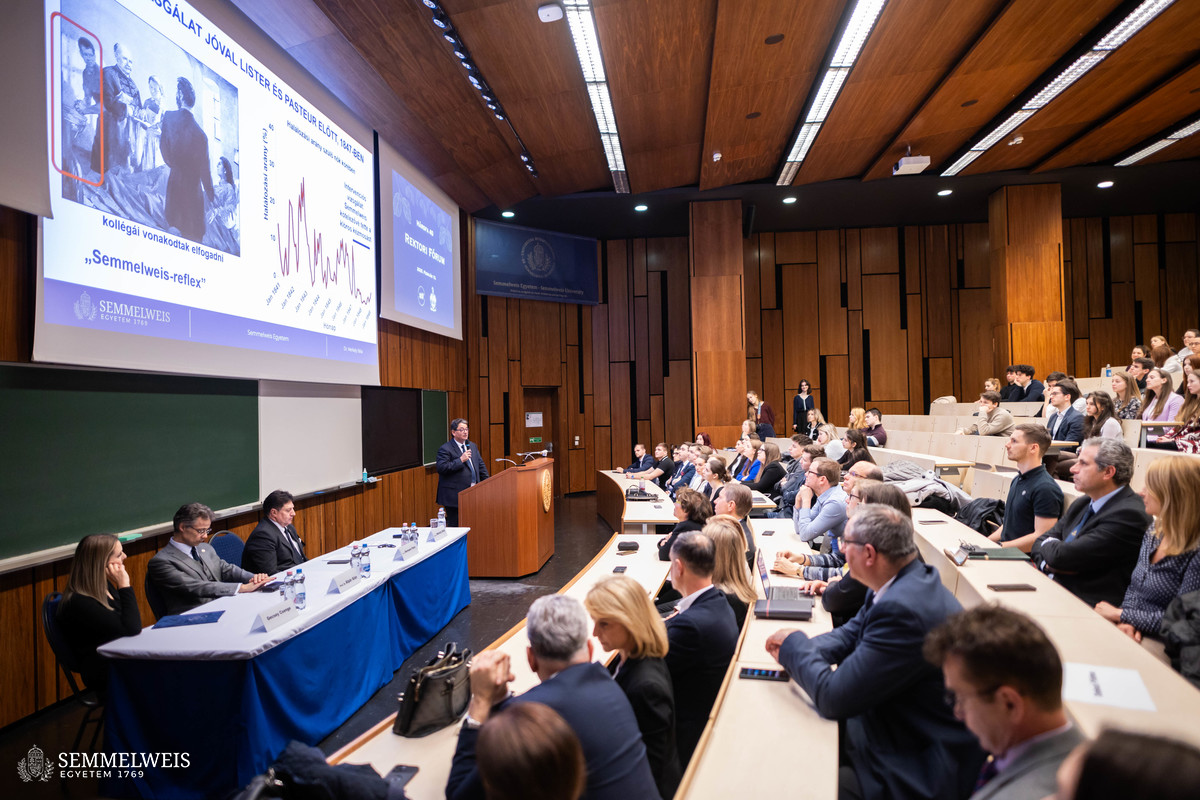
Enhancing Medical Education through Patient-Centered Approaches at Semmelweis University
Semmelweis University in Hungary stands out as a leading institution in medical and health sciences, emphasizing a practice-oriented approach that prioritizes patient care. The recent students’ forum organized by the university exemplifies its commitment to fostering an educational environment that values student engagement, clinical skills, and direct interaction with patients. This focus aligns with the broader goal of training healthcare professionals who are not only academically proficient but also deeply connected to the well-being of their future patients.
Student Engagement and Leadership: A Reflection of Semmelweis University’s Commitment to Patient Care
The forum held recently at the Basic Medical Science Center showcased how the university encourages students to actively participate in shaping their educational journey. Organized jointly by the Frigyes Korányi College for Advanced Studies and the Students’ Union, the event allowed students to pose questions directly to university leaders, including Rector Dr. Béla Merkely. Such initiatives demonstrate the university’s dedication to transparent dialogue and responsive governance, ensuring that future healthcare professionals are prepared to embody patient-centered values in their careers.
The Role of Practical Training in Medical Education at Semmelweis University
A central theme of the forum was the importance of practical, bedside training. The university’s curriculum emphasizes clinical skills such as drawing blood, performing punctures, and participating in procedures like cardioversion. Rector Dr. Merkely highlighted that comprehensive hands-on experience is crucial for developing competent doctors who can confidently deliver patient care. The recent curricular reforms aim to enhance this aspect further by increasing practical training hours and opportunities for direct patient interaction, ensuring students are well-prepared for real-world medical scenarios.
Curricular Reforms and Their Impact on Patient-Centered Training
In response to student and faculty input, Semmelweis University has implemented curricular changes to reinforce practice-based learning. Notably, the introduction of a 90% attendance policy for practical classes underscores the institution’s focus on experiential learning. Flexible options for catch-up sessions further support student development, recognizing that mastery of clinical skills directly influences patient safety and care quality.
Investing in Infrastructure and Research to Support Excellence in Medical Training
Semmelweis University allocates significant resources to infrastructure development, with around HUF 50 billion dedicated to expanding and upgrading facilities. Projects such as the EOK 2 expansion and the National Training Center for Medical Innovation (NOIKK) provide state-of-the-art spaces for simulation, robotic, and cadaveric surgeries, enriching the learning environment for students. These investments reflect the university’s commitment to integrating cutting-edge technology into medical education, ultimately benefiting patient care by training doctors who are adept at advanced medical procedures.
Expanding Clinical Networks and Study Opportunities Abroad
Growing clinical networks enable students to gain diverse practical experience across various specialties such as traumatology, neurosurgery, rheumatology, and physiotherapy. The university also promotes international mobility through programs like the Pannónia Scholarship, encouraging students to undertake study trips and internships abroad. Rector Dr. Merkely emphasized that international exposure broadens students’ perspectives and fosters a patient-centered approach rooted in understanding different healthcare contexts.
Building a Culture of Patient-Centered Care in Hungary
Semmelweis University’s strategic focus on patient care is evident in its expanding network of healthcare facilities and integration of new specialties. The inclusion of services like neurointervention, rehabilitation, and rheumatology enhances the breadth and quality of clinical training. By emphasizing the importance of hands-on experience and direct patient interactions, the university aims to produce healthcare professionals who are not only technically skilled but also empathetic, ethical, and attentive to individual patient needs.
Supporting Future Healthcare Professionals through Comprehensive Education and Research
Beyond clinical skills, Semmelweis University fosters a vibrant research environment. Approximately 1,000 researchers, 30 research groups, and an increasing number of PhD students contribute to scientific advances that elevate patient care standards. The university’s aspiration to be among the top 100 universities in the world underscores its dedication to excellence, innovation, and leadership in medical education.
Take the Next Step in Medical Education with Semmelweis University
For aspiring healthcare professionals eager to develop their clinical and research skills within a patient-centered framework, Semmelweis University offers a comprehensive, practice-oriented education. Its investments in infrastructure, international programs, and emphasis on bedside training prepare students to meet the evolving demands of modern medicine.
Interested in learning more about their programs or applying to Semmelweis University? Discover if this region’s top medical institution aligns with your career goals—submit your application today.

